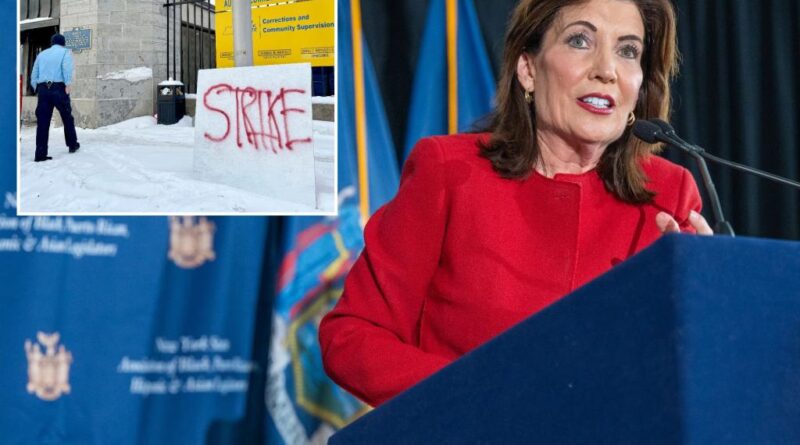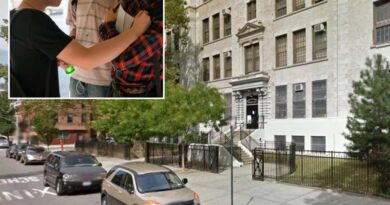Timid Hochul Sparks Turmoil as Wildcat Strikes Expand in Prisons

A fundamental aspect of New York state law — its ban on strikes by public employees — is under threat of disintegration, as Governor Hochul urgently attempts to piece the fragments back together.
Corrections officers at two upstate prisons refused to report for their scheduled shifts on Monday morning, following a violent uprising by inmates that occurred at one of the prisons a week earlier.
By Tuesday, corrections officers in up to 20 other state facilities had also walked off the job, as reported.
Strikes have always been prohibited in New York’s public sector (except for commuter railways governed by federal law). This restriction stems from the 1967 Public Employees’ Fair Employment Act, popularly known as the Taylor Law, which updated previous prohibitions.
Hochul delayed more than 24 hours before addressing the strike (initially directing reporters to the Department of Corrections and Community Supervision’s press representatives).
On Tuesday afternoon, she mentioned that she will deploy the National Guard if corrections officers are not back at work by Wednesday and will “take the appropriate disciplinary action as necessary.”
However, significant damage to the deterrent effect of the strike prohibition has already occurred.
The Taylor Law was designed with the understanding that the state’s top leaders would enforce it swiftly and thoroughly. Hochul has not done so.
The union representing the corrections officers, the New York State Correctional Officers and Police Benevolent Association, has maintained a strained relationship with the Hochul administration on a variety of issues, including staffing levels, safety, potential prison closures, and a 2021 law signed by former Governor Andrew Cuomo that limited the ability of corrections officers to place inmates in solitary confinement.
Union officials stated they were “keenly aware” of the strikes and that they were “not in any way sanctioned by NYSCOPBA.”
“Staff chose to not enter for their work shifts due to dissatisfaction with current working conditions,” the union asserted in a statement.
Historically, state authorities have been quick to penalize unions for allowing strikes, even spontaneous actions.
The state Public Employment Relations Board, which supervises the Taylor Law and has upheld its strike ban for nearly 60 years, held the Buffalo Teachers Federation accountable for a 2018 sick-out, where at least 16 teachers reported illness following an assault on a student outside the school.
The teachers faced pay deductions, and the union lost its ability to collect dues from any employee paychecks for two months. While the union appealed the decision, an appellate panel unanimously sided with PERB.
PERB’s strong reaction to the Buffalo wildcat incident likely contributed to the prevention of a planned strike by Rochester teachers in March 2020, as well as other anticipated actions as schools reopened following the coronavirus lockdown later that year.
New York state grants significant privileges to public employee unions. Government payroll offices handle the collection and remittance of dues at no cost to the unions.
The state’s “exclusive representation” system means individual employees cannot alter their employment conditions without going through the union. High-ranking union officials are often released from their government positions, and unions are provided their own offices within government buildings.
New employees are compelled to attend union pressure meetings and can be contacted at home if they don’t enroll to pay dues.
All these advantages depend on the understanding that government services will not be disrupted by public-employee strikes.
In a prison context, the safety of both inmates and corrections officers becomes increasingly compromised as the strikes persist.
The Taylor Law provides unions with several legal avenues to address complaints regarding working conditions that might otherwise lead to a strike, but NYSCOPBA appears not to have pursued these options.
Crucially, under state law, it is the responsibility of the public employer’s chief executive officer — in this case, Governor Hochul — to inform PERB of any illegal strike, which is tasked with assessing the union’s accountability.
The law also mandates that the governor notify the state’s chief fiscal officer, Comptroller Tom DiNapoli, so he may deduct two days’ pay for each day of the strike.
Furthermore, the Taylor Law requires Hochul to instruct the state’s chief legal officer, Attorney General Letitia James, to file in state Supreme Court for an injunction against the strikers.
Hochul stated on Tuesday that she has directed her counsel to “work with” James’ office — however, her actions send mixed signals about how she intends to enforce accountability for a situation that has recklessly endangered the safety of both corrections officers and inmates.
This is shaping up to be the largest public-employee strike in New York since 2005, when city transit workers effectively paralyzed the city’s economy by walking off the job.
Back then, state officials acted decisively, imposing fines on the union and revoking its ability to collect dues.
Then-Attorney General Eliot Spitzer fulfilled his obligations under the Taylor Law while simultaneously running his campaign for governor.
If state or local officials become accustomed to ignoring the existence of a strike, the prohibitions imposed by the Taylor Law will lose all significance.
This will pave the way for more sickouts and other spontaneous actions, endangering essential government services.
Hochul and James, in their criticisms of President Trump, have consistently expressed concerns regarding his alleged threats to the rule of law.
New Yorkers expect them to uphold their lawful responsibilities right here at home.
Ken Girardin is the research director at the Empire Center for Public Policy.



